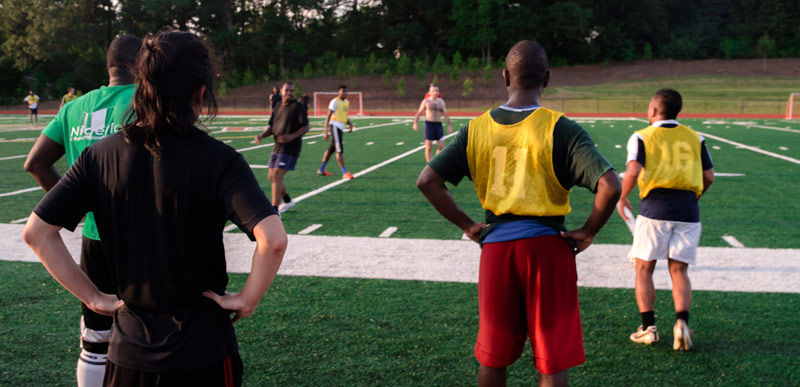Parents want to be a part of their child’s development in ALL walks of life. You only have to see the excitement when a child takes their first step or says their first word. Photo albums upon photo albums of children doing the most random things are commonplace. It’s easy to empathise with parents wanting to feel that they had a role to play in their child’s growth into becoming an adult. This includes when they play soccer.
I used to think parents were the enemy. Judging by the views of others, I wasn’t alone. I now know that it was the wrong attitude to adopt. It is important that we as coaches allow parents to feel a part of their child’s development. Yet we must also make sure that we stick to our principles and help to educate them into how they can help their child grow.
Lay out your plans for the season…FACE to FACE

Managers in any walk of life will meet their employees on the first day on the job. It allows them to introduce themselves, dicsuss their experience & suitability and lay out their plans. While parents are not employees, this approach should be followed at the start of every season.
I make a point of having a face to face meeting with the parents of every new team that I coach. This usually takes place after the first session. It allows me to tell them who I am, my coaching experience, my goals for the team and my expectations of the players and parents. I also inform them of what they can expect from me. This is just as important as it provides standards that I must be held accountable for.
Doing this face to face is vital. In this technological day and age, it is so easy to blast out an e-mail and leave it at that. Your eye contact, body language and voice tone will tell parents just how confident you are in what you believe is the right way to develop their children. Done right, it inspires confidence in those parents.
Look at the Long-Term

What are you developing the players for?
I have asked this question to coaches many times, often without an answer. Development has become a very en-vogue word in coaching. Though the intentions of many are good, I have seen my fair share of coaches use it as an excuse for poor coaching.
Detailing to your parents what your long-term development goals are allows them to paint the picture in their head. Don’t just talk about the season ahead but tell them about when their kids finish school.
My personal development plan is as follows
Give players the impetus to play at the highest level possible – High School, College, Academy, Pro
Make lifelong fans of the game – spectators, players, coaches, refs
Provide life lessons that they can take with them into their future careers – leadership, self evaluation, team work, work ethic
These may not be your development goals. You may wish to win every trophy at youth level. It maybe that you want every player to master one specific position. Whatever your Long-term Player Development plans are, let the parents know.
Keep Them Up To Date With Weekly E-mails

Despite my earlier comments on electronic communication, there are times when it comes in handy. Apps like Heja & Team Snap are great for keeping parents up to date on practice and game logistics.
In a similar manner, a weekly e-mail can go a long way to keeping parents on the same wavelength as the coach. For the past 3 years, I have sent 2 e-mails a week – pre-match and post-match. Pre-match has been the biggest help. It has allowed me to tell the parents what the players have worked on in practice, what I am looking for in the game and, for certain teams, what the overall game plan is.
By providing this information to parents, it allows those who can’t help themselves from being vocal to relay similar points to myself. It is not an ideal situation, but it means the players are not getting confused with conflicting comments.
Provide Roles For Your Most Enthusiastic Parents

Parents are enthusiastic and as coaches we should want them to be! If they weren’t, chances are we’d be left on the field with a bag of balls, a set of cones and no players. As with any individual who displays over-enthusiasm, we need to manage those qualities to the benefit of everyone, including themselves. Giving them team roles that embraces that energy, as well as helping you & the players means that EVERYBODY wins.
When I moved to North Carolina, I was given 2 assistant coaches* to help me with one of my teams.
*I should say at this point, over enthusiasm wasn’t a problem with these two parents. One was the perfect example of letting their child play the game.
As a way of making sure that they felt valued I gave them tasks on the sideline. I asked the more emotionally charged assistant to speak with the subs. He pointed out situations on the field and gave them 1 to 1 advice for when they went on. The more mellow of the 2 was in charge of monitoring the time. He made sure I knew when I had to sub players in. Additionally, we had a team manager (secretary) on the parents’ side of the field, reminding them of the team rules and answering questions. This allowed me to focus on the game and make sure the players were hearing one voice instead of 10.
Give Some Outrageous Examples

Sport brings out the worst in people. I’ve lost count of the amount of times I’ve been sat down in the Holte End at Villa Park screaming all sorts of insults to both the opposition and our players. I would never do that in any other life arena. Sport is emotional, and when a person’s own flesh and blood is involved, those emotions are often multiplied by a million. The behaviour that happens as a result is so ridiculous that it would be out of place in an episode of Family Guy!
Highlighting this behavior in an example that parents can relate to but also see as ridiculous is a great tool for getting them to calm down. It gets a laugh, provides no public humiliation and paints the picture of the absurdity of certain actions.
Example 1 – A change in school exams
A child is sitting a Maths exam. While figuring out the answer, their parent is screaming “Add! Add!! Take it away!!! MULTIPLY!!!!!!!!!!!! NO, NO, NO….WHAT ARE YOU DOING?!?!”
Example 2 – Would you take it at work
The parent is sitting at work, figuring out (insert work task). While trying to do it, their supervisor is standing over their shoulder, correcting every minor mistake, tweaking every little thing and dictating every action.
Example 3 – A player signs for Man City
The best player in the team has had their Dad control them in every game they have ever played, from U8 – U18. Every time the player has the ball, Dad tells them “pass” or “shoot” or “dribble”. Every time the player has got the decision right, scoring 50 goals a season, every season. Man City take notice and offer the player a contract. His first game is the Champions League final against Barcelona. Pep Guardiola brings him on and the ball comes to the player. With 80,000 fans making noise, the player can’t hear his Dad. He freezes, loses the ball and Barca counter attack and score as a result. Man City lose 1-0 and as he is walking off the field, Guardiola tells him “you’re not ready.”
Example 4 – The best players have the quietest parents
I watched a school game, involving a player I knew. The only thing his Dad said on the sideline was when he told him off for unsporting behaviour after he scored. Next to him was a Dad who was constantly on at his son. “Do better!”” Control it!” “That’s not good enough” were consistent phrases.
The boy with the noisy Dad couldn’t control the ball. He looked nervous any time it came near him.
The boy with the quiet Dad currently has a career in the pro game.
Have a Parent Game With The KIds Watching

Organise a game for the parents to play against each other. You coach one of the teams and have the children stand on the side and scream, shout and yell at them. If you can get some of the coaches at your club to be on the sideline coaching their every movement even better. They’ll soon get the idea of why you need to be the one voice the kids hear.
Accept That Some Won’t Listen Immediately…Just Give Them Time

Some parents will debate your decision. They will question if you know what you’re doing regardless of what steps you take. I once heard a fan suggest Alex Ferguson be sacked in the late 2000’s on Talksport…madness! If it can happen to him, it can happen to all of us.
A few years ago I was Head Coach of a U11 Girls team. From the first session I had with them I knew I had a special group of players, the majority of who had a very real opportunity of playing college soccer. As a result, I believed that I should be coaching them with the attitude of players first, team second. I took the mentality that I was going to rotate positions frequently up until U13 (11 v 11), to enable them to become better all-around players and work on specific attributes. Short-term it would cause some defeats in games, but long-term I felt that those players would have a better chance of playing at the level they wanted.
I explained this to the parents at our pre-season meeting. Many were on board with what I wanted. There was one parent, coming from a background of American Football where players get pigeon-holed, who disagreed. He was convinced that his daughter was a left winger and that playing her on the right side was wrong. This was his mentality for a year and a half.
I went to watch his daughter play shortly after she moved on to play at Academy level. He welcomed me with open arms and stated that I was right in my approach. He couldn’t believe the improvements his daughter had made. She was more confident with her right foot, capable of cutting inside or going around the outside and had far better positional understanding. It took time, but eventually the agreement came.
